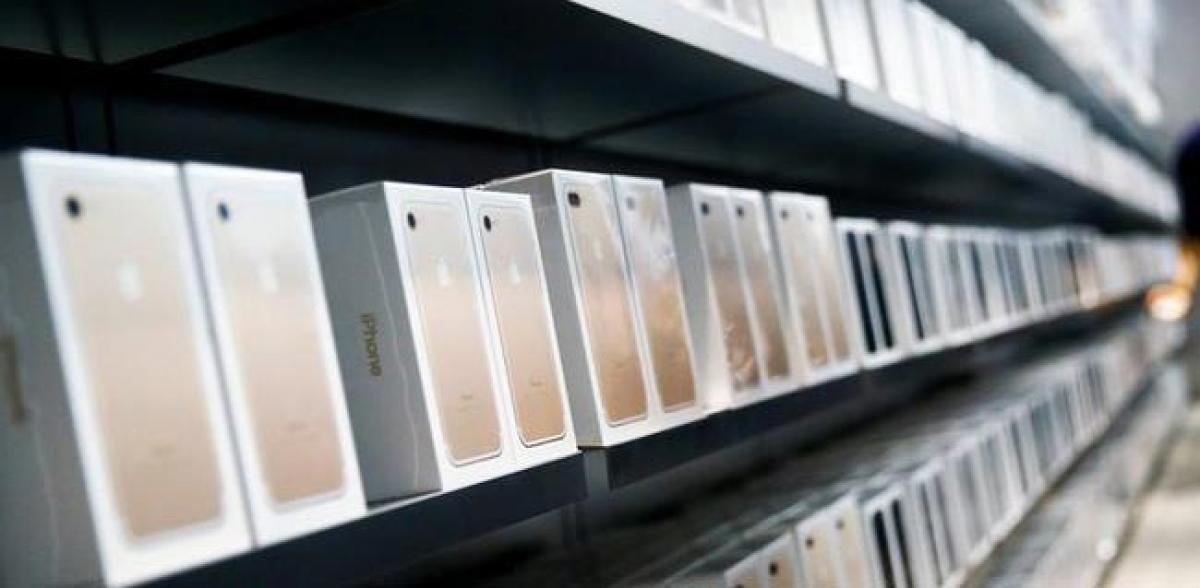Live
- Tim Southee matches Chris Gayle's six-hitting record in his farewell Test
- AP Mnister Ponguru Narayana Inspects Highway Connectivity Roads to Amaravati
- Reduced inflow: Water levels in Chembarambakkam, Poondi reservoirs drop
- Slapgate haunts CM as Rohini slams Nitish following Patna DM’s action against BPSC candidate
- Amazon Music India Unveils 'Best Of 2024’ Celebrating Top Hits, Artists & Podcasts
- Kejriwal writes to HM Shah on law and order, seeks urgent meeting
- Big e-commerce firms to adopt Safety Pledge on National Consumer Day
- Cop ends life over torture by wife, father-in-law in Bengaluru
- Indian Constitution longest and most beautiful, Kiren Rijiju lauds its inclusive character
- BSNL's Rs 333 Plan Challenges Airtel and Jio with 1300GB Data: Details
Just In

Japanese regulators are considering taking action against Apple Inc over possible antitrust violations that may have helped it dominate the nation\'s smartphone sales, government sources said, a move that could hit the company\'s profit margins in one of its most profitable markets.
Japanese regulators are considering taking action against Apple Inc over possible antitrust violations that may have helped it dominate the nation's smartphone sales, government sources said, a move that could hit the company's profit margins in one of its most profitable markets.
In a report published last month, Japan's Fair Trade Commission (FTC) said that NTT Docomo, KDDI Corp and Softbank Group were refusing to sell older surplus iPhone models to third party retailers, thereby hobbling smaller competitors.
Apple was not named in that report, but two senior government sources told Reuters that regulators were also focusing on Apple's supply agreements with all three carriers.
Under those deals, surplus stock of older iPhones is kept out of the market and sent to overseas markets, such as Hong Kong, according to industry sources.
The carriers, locked in a costly battle to win consumers who covet iPhones, also bulk purchase the Apple smartphones and sell them at a discount, which gives the U.S. company an advantage over rivals such as Samsung Electronics Co, according to the two government officials and an industry source.
Both iPhone 7 and Samsung's Galaxy S7 edge model sell for 93,960 yen ($932) under Docomo's main service package without any contract, but the cost for the iPhone drops sharply to 38,232 yen with a two-year contract, while the Galaxy falls to 54,432 yen.
When asked about the antitrust concerns, Apple forwarded a link to a webpage published at the time of the Aug. 2 FTC report that says it has created or supports 715,000 jobs in Japan with Japanese-based developers raking in more than $9 billion in revenue from Apple apps since 2008. It did not comment further.
LARGEST SHARE
The strategy has helped Apple sustain demand for new iPhones, making Japan one of its most profitable markets. The U.S. company accounts for almost one in every two smartphones sold in Japan, its largest share in a major market.
It also kept new mobile service providers such as messaging app firm Line Corp and online retailer Rakuten Inc from selling iPhones, and helped the top three carriers control more than 90 percent of the mobile phone market.
Any government order for corrective measures may crimp demand for more profitable new iPhone models that compete against well-reviewed Android phones such as the Galaxy S7.
"The actions of the three operators alone do not account for the state of the market," said one of the officials, who confirmed that the August report was also directed at Apple. "We are getting closer to taking action."
The officials said the watchdog hoped pressing the carriers would get them to solve the antitrust issue, which could include renegotiating contracts with Apple.
They asked not to be identified because they are not authorized to speak to the media.
The FTC did not give a deadline or say what penalties, such as fines, it would impose if the companies did not act.
In the past, FTC has issued cease and desist orders, and imposed a "surplus charge" to recoup profits resulting from antitrust violations. The biggest surplus charge to date for a case, which involved five companies, is 27 billion yen ($269 million).
Fines on companies judged to be operating cartels or monopolies, however, can be higher.
NTT Docomo said it did not believe it was blocking new entrants. "We have always strived to conduct sales and services appropriately and we will take the FTC's report on board and consider our response," a spokesman said.
A spokeswoman for KDDI said her company had operated its business in an appropriate manner and followed guidelines.
A Softbank spokesman also said it would work with regulators. "Up to now we have never had any issues with competition laws over our sales practices and pricing," he said.
Samsung declined to comment.
($1 = 101.87 yen)

© 2024 Hyderabad Media House Limited/The Hans India. All rights reserved. Powered by hocalwire.com







